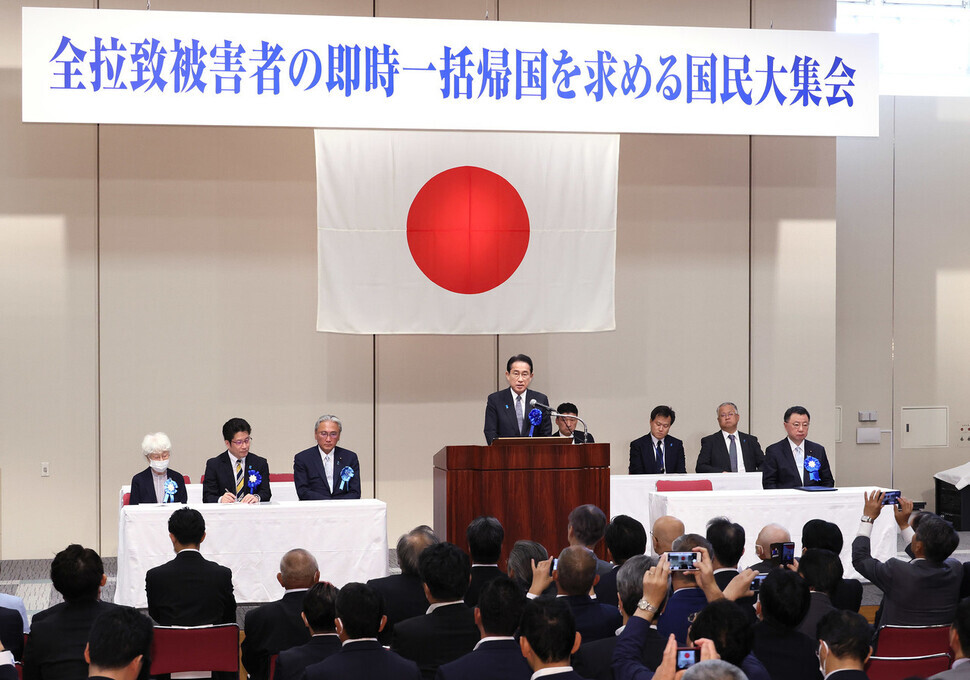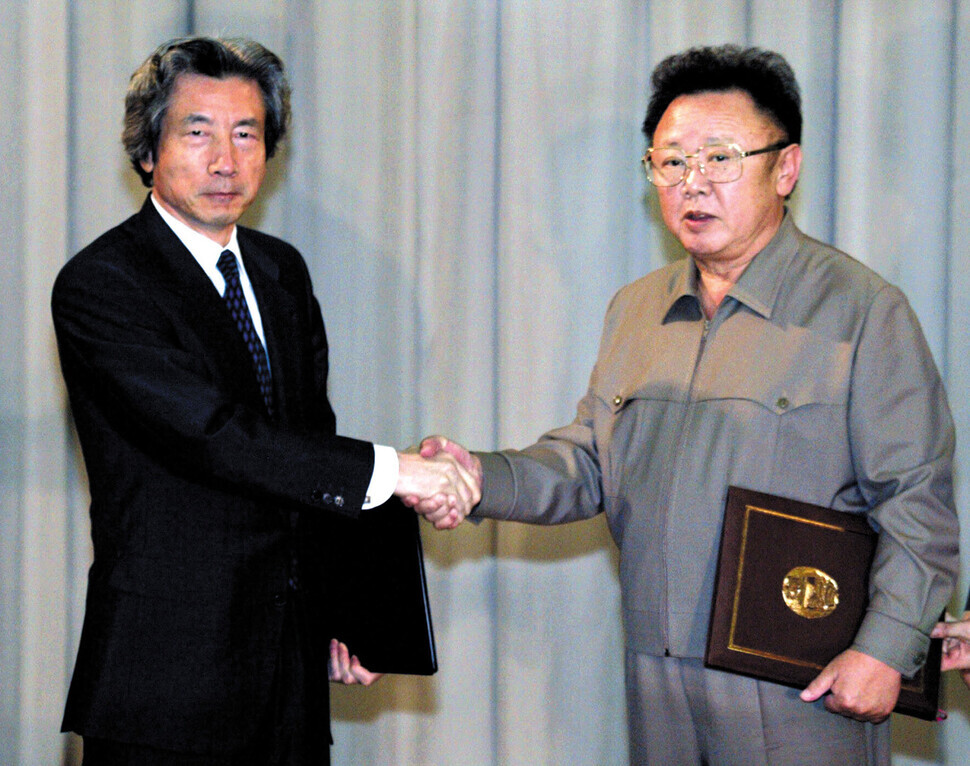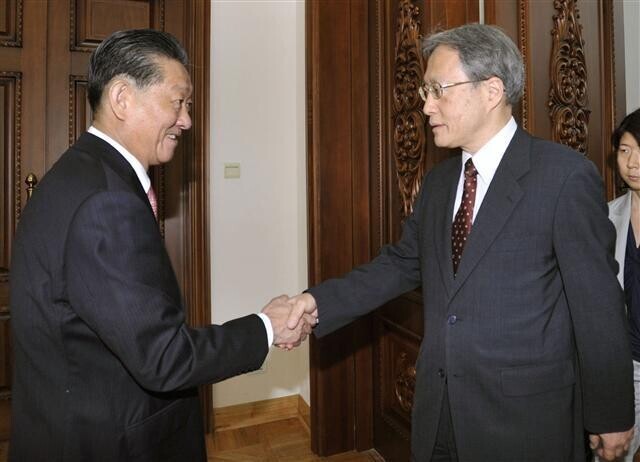hankyoreh
Links to other country sites 다른 나라 사이트 링크
As clock ticks on abductee issue, Kishida ramps up efforts to engage N. Korea

At the end of September — in the middle of Korea’s extended Chuseok holiday — a fascinating article appeared in Japan that was bound to be of keen interest in Korea as well. In a front-page exclusive article in its Sept. 29 edition, the Japanese newspaper the Asahi Shimbun claimed that the North Korean and Japanese governments had held two secret meetings in Southeast Asia this past spring.
Citing numerous sources familiar with North Korea-Japan relations, the newspaper said Japanese government officials had had two “secret meetings” with officials from the Workers’ Party of Korea in a Southeast Asian city in March and May.
Even more astonishing was the news that followed: a report that Prime Minister Fumio Kishida saw the possibility of setting the stage for a summit with North Korean leader Kim Jong-un, and that at one point in early autumn he considered sending senior government officials to Pyongyang, although this did not end up happening.
The report generated shock waves, and in a regular press conference the same day, Japan’s chief cabinet secretary, Hirokazu Matsuno, said he was “aware of the content in the reports” but would “refrain from commenting due to the nature of the issue.”
By refraining from commenting without denying the reports, he effectively acknowledged that the article’s content was true.
The first signs of significant behind-the-scenes activities between Pyongyang and Tokyo actually date back to late May. While attending a citizens rally on May 27 to demand the immediate return of all abduction victims organized by family members of Japanese abductees to North Korea, Kishida made some unusual and unprecedented remarks.
“I believe that it is critical that both Japan and I make proactive efforts and build relations between leaders,” he said at the time.
“I will continue to seize every possible opportunity to convey my determination to Chairman Kim Jong-Un from the perspective of resolving outstanding issues of concern in Japan-North Korea relations and jointly carving out a new era. At the same time, Japan will press forward proactively, engaging in high-level consultations while reporting directly to me, to bring about summit-level talks at an early time.”

Around 2019, the late Shinzo Abe (1954–2022), who rose to become Japan’s prime minister in part on the back of his commitment to resolving the abduction issue, also began repeatedly expressing his intent to communicate directly with Pyongyang to tackle the issue.
Reacting to the collapse of a North Korea-US summit in late February 2019, Abe said that he had “resolved to meet directly with Chairman Kim Jong-un.” A few months later, he said on May 6 that he had “resolved to meet with Chairman Kim Jong-un without any preconditions.”
But Kishida went even further with his unusual mention of “high-level discussions” taking place “while reporting directly” to him. The fact that a Japanese prime minister was making such a concrete statement on meetings with North Korea in front of family members of abduction victims clearly signaled that meaningful communications of some kind were indeed taking place with Pyongyang.
The biggest reason for Kishida to state his commitment on the issue may have been the fact that he is running out of time to resolve it as the family members of abductees in advanced age.
In 2020, Shigeru Yokota (1932–2020) the former president of the Association of the Families of Victims Kidnapped by North Korea, passed away. His daughter Megumi Yokota (b. 1964) became a living symbol of the Japanese abductee issue following her disappearance from Japan’s Niigata Prefecture in 1977, when she was a first-year student in middle school.
The presidency was passed on to Shigeo Izuka (1938–2021), the older brother of abductee Yaeko Taguchi. Izuka also passed away in 2021.
Kishida may have been motivated by the urgency of the situation — with the possibility that the issue might remain forever unresolved with the death of Megumi Yokota’s mother Sakie, 87, who had tirelessly battled alongside her late husband to resolve the injustice committed against their daughter.
Experts on North Korea-Japan relations began watching closely for the response from Pyongyang. Just two days after Kishida’s remarks, the Korean Central News Agency published a statement by North Korean Vice Foreign Minister Pak Sang-gil.
“Japan is now talking about the ‘summit talks without preconditions’ but, in fact, it is clamoring for settlement over the abduction issue, which had already been resolved, and the DPRK's right to self-defence, and putting forward it as a precondition for improving the DPRK-Japan relations,” the statement read.
“[I]f [Japan] tries to fulfill the unrealizable desire by employing the methods used by the preceding regimes without any better proposals and bold decision to rewrite history, it will be a miscalculation and a waste of time,” it continued.
“It is the stand of the DPRK government that if Japan tries to make a new decision from a broad perspective [. . .] and seeks a way out for improving the relations, there is no reason for the DPRK and Japan not to meet,” it said.
While the statement left open the possibility of dialogue with Japan, it also echoed the message Pyongyang had stated while Kishida’s predecessor Abe was in power — namely that any meeting would be meaningless if Japan names the abduction issue, which the North considers “resolved,” or North Korea’s “right to self-defense” (i.e., denuclearization) as preconditions for normalizing relations.

Indeed, North Korea has insisted that the abductee issue has been “resolved” ever since a visit to Pyongyang by then-Japanese Prime Minister Junichiro Koizumi in September 2002, when then-North Korean leader Kim Jong-il formally apologized and sent home five surviving abduction victims.
The Japanese government has countered with the three “Abe principles,” which hold that the abduction issue is the most crucial matter facing Japan, that diplomatic relations cannot be normalized without a resolution to it, and that efforts for the return of abduction victims are based on the assumption that all of them are still alive.
From this position, it has demanded the return of abductees that North Korea claims have died, as they are seen as very likely to still be living.
Through an agreement brokered in Stockholm in May 2014 and other approaches, the two sides have worked to resolve the issue — but because of this fundamental difference in perspectives, the door to official intergovernmental dialogue has remained closed since early 2016.
What significant results might have come from the meetings between Pyongyang and Tokyo last spring? According to the report, the North Korean and Japanese representatives exchanged a wide range of views on various matters between the two sides over the course of the two meetings.
Based on their awareness of North Korea’s internal situation, the Japanese government concluded that the Workers’ Party of Korea officials who attended were connected with the party’s core leadership and figures close to Kim Jong-un. It also came away with the impression that Pyongyang was “ambitious” about the prospects of dialogue with Tokyo.
If this is true, it would mean that Pyongyang was looking to use Tokyo as an avenue toward a new diplomatic breakthrough at a time when its dialogue with Washington has been broken off in the wake of the no-deal summit in Hanoi in late February 2019 and the poor state of inter-Korean relations since the Yoon Suk-yeol administration took office in South Korea in May 2022.
But it also appears that the two sides walked away with nothing to show for the efforts due to fundamental differences in their views on the abduction issue.
Unbeknownst to the South Korean public, this minor failed attempt between North Korea and Japan had a considerable impact on the political situation surrounding the Korean Peninsula. Having judged that it had more or less nothing to gain from approaching Japan, North Korea appears to have shifted toward improving relations with Russia — at least since July of this year.
North Korea took part in its first summit with Russia in four years on Sept. 13, which was occasioned by Russian Defense Minister Sergey Shoigu’s participation in an event marking the armistice in Korea — celebrated in North Korea as a “Day of Great Victory” — on July 27.
Chances of North Korea and Japan initiating any real dialogue are negligible, but there are signs of a shift in attitude within Japan.
In its October issue, the literary magazine Bungei Shunju published Isao Iijima’s records of his talks with North Korea in May 2013, when he visited North Korea to negotiate on the issue of abductions in his capacity as special advisor to Japan’s cabinet secretariat. In the piece, he strongly advocated for the easing of Tokyo-Pyongyang ties. Expressing dismay that the few still alive who know about the abduction issue are passing away one by one, Iijima appealed to readers: “Now, more than ever, all of Japan must change the current state of North Korea-Japan negotiations.”
Even Kishida appears not to have given up on dialogue with Pyongyang. In a policy speech to the extraordinary session of the parliament on Oct. 23, Kishida said Japan would “advance high-level discussions under my direct initiative to realize a summit” with Kim Jong-un while seeking to resolve various issues between the two sides.
“I will make decisions from a wide perspective in order to build a fruitful relationship between Japan and North Korea that meets the interests of both countries and contribute significantly to peace and stability in the region,” he said.
By Gil Yun-hyung, staff reporter
Please direct questions or comments to [english@hani.co.kr]

Editorial・opinion
![[Editorial] Perilous stakes of Trump’s rhetoric around US troop pullout from Korea [Editorial] Perilous stakes of Trump’s rhetoric around US troop pullout from Korea](https://flexible.img.hani.co.kr/flexible/normal/500/300/imgdb/original/2024/0509/221715238827911.jpg) [Editorial] Perilous stakes of Trump’s rhetoric around US troop pullout from Korea
[Editorial] Perilous stakes of Trump’s rhetoric around US troop pullout from Korea![[Guest essay] Preventing Korean Peninsula from becoming front line of new cold war [Guest essay] Preventing Korean Peninsula from becoming front line of new cold war](https://flexible.img.hani.co.kr/flexible/normal/500/300/imgdb/original/2024/0507/7217150679227807.jpg) [Guest essay] Preventing Korean Peninsula from becoming front line of new cold war
[Guest essay] Preventing Korean Peninsula from becoming front line of new cold war- [Column] The state is back — but is it in business?
- [Column] Life on our Trisolaris
- [Editorial] Penalties for airing allegations against Korea’s first lady endanger free press
- [Editorial] Yoon must halt procurement of SM-3 interceptor missiles
- [Guest essay] Maybe Korea’s rapid population decline is an opportunity, not a crisis
- [Column] Can Yoon steer diplomacy with Russia, China back on track?
- [Column] Season 2 of special prosecutor probe may be coming to Korea soon
- [Column] Park Geun-hye déjà vu in Yoon Suk-yeol
Most viewed articles
- 160% of young Koreans see no need to have kids after marriage
- 2‘Free Palestine!’: Anti-war protest wave comes to Korean campuses
- 3Behind-the-times gender change regulations leave trans Koreans in the lurch
- 4In Yoon’s Korea, a government ‘of, by and for prosecutors,’ says civic group
- 5[Editorial] Perilous stakes of Trump’s rhetoric around US troop pullout from Korea
- 6Korean president’s jailed mother-in-law approved for parole
- 7Nuclear South Korea? The hidden implication of hints at US troop withdrawal
- 8[Photo] ‘End the genocide in Gaza’: Students in Korea join global anti-war protest wave
- 9Yoon’s revival of civil affairs senior secretary criticized as shield against judicial scrutiny
- 10Family that exposed military cover-up of loved one’s death reflect on Marine’s death